More than a Glitch: Confronting Race, Gender, and Party Bias in Nigeria Political Arena

By Hamza Yakubu
In Nigeria’s tumultuous political landscape, deep-rooted biases often intertwine to create a complex web of exclusion and discrimination. While issues of race, gender, and party bias may appear as separate entities, the truth is that they are interconnected and deeply intertwined, shaping the way politics is conducted in the country.
At the heart of Nigeria’s political sphere is a stark imbalance in power dynamics that perpetuates inequality and marginalization. The legacy of colonialism and the subsequent post-independence struggles have left a lasting impact on the country’s political system, with certain ethnic and religious groups wielding disproportionate influence over decision-making processes. This has resulted in the exclusion of marginalized communities, who are often sidelined and ignored in the political discourse.
Moreover, gender bias remains a pervasive issue in Nigerian politics, with women severely underrepresented in positions of power. Despite the passage of gender equality laws and the introduction of affirmative action policies, women continue to face numerous barriers to political participation, including cultural norms, discriminatory laws, and institutionalized sexism. As a result, women are often overlooked for leadership roles, perpetuating a cycle of male dominance in Nigerian politics.
Party bias further complicates the political landscape, with entrenched party loyalties often overshadowing individual merit and qualifications. This has led to a system where meritocracy takes a backseat to political expediency, with party affiliation dictating access to resources and opportunities. As a result, talented individuals are often overlooked in favor of less qualified candidates who have the right connections within the political establishment.
Confronting these biases requires a concerted effort to address the root causes of inequality and discrimination in Nigerian politics. This includes dismantling institutional barriers that hinder the participation of marginalized groups, promoting diversity and inclusivity in decision-making processes, and creating an environment where merit and talent are rewarded over political connections.
Ultimately, confronting race, gender, and party bias in Nigerian politics is essential for building a more just and equitable society. By acknowledging and addressing these biases head-on, Nigeria can create a more inclusive political system that reflects the diversity and plurality of its citizens. Only then can the country truly move beyond the glitches that have plagued its political system for far too long.








